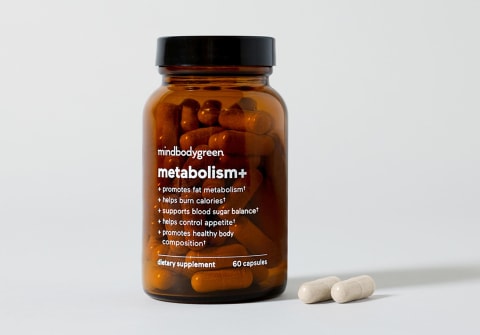Advertisement
8 Ways To Speed Up Your Metabolism & Optimize Your Metabolic Well-Being


If you've ever lamented a too-slow metabolism, you're in good company. Over 90% (!!) of Americans have suboptimal metabolic health, according to data from the National Health and Nutrition Examination Survey.
Experts came to this conclusion after analyzing fasting glucose, hemoglobin, A1c, blood pressure, and lipid levels. Another metric of metabolic health? Your metabolism (aka metabolic rate).
Although perhaps most famous for its impact on our body weight, having a "slower" or less efficient metabolism is a much bigger picture. Suboptimal metabolism can affect the body’s ability to optimally support its most basic biological processes.
And while it's true that genetics partially determine your metabolic rate, it doesn't seal your fate by any means; the things you do on a daily basis can have an even bigger impact. Translation? Lifestyle habits and behaviors provide ample opportunities to improve your metabolism and, ultimately, enhance your overall well-being.
Here, learn how to speed up your metabolism via approachable, multidimensional strategies, according to research.
What even is metabolism?
In the simplest terms, "Metabolism is the process by which your body turns what you eat into energy," Casey Kelley, M.D., ABOIM, functional physician and founder of Case Integrative Health, tells mbg.
This energy (i.e., calories) is used, or "burned," to fuel your most basic bodily functions—such as breathing, blood circulation, and nutrient absorption.
It also provides energy for complex physiological reactions (including DNA synthesis, RNA transcription, and neuronal cell signaling in the brain), as well as actions that require more energy, (like immune function, healthy inflammatory responses, and physical activity).
Needless to say, your metabolism affects a lot.
Metabolism is closely related to metabolic rate, or the energy/calories you use, or "burn," every day. Metabolic rate also depends on:
- Basal metabolic rate. Closely related to basal metabolic rate is resting metabolic rate (RMR), or resting energy expenditure (REE), which is the number of calories the body burns at rest and makes up 60% to 75% of the total calories you burn each day. BMR is the energy (i.e., calories) needed to "keep the lights on" in your body (think breathing, muscle contractions that keep food moving through your GI tract, body temperature control, etc.). Many factors can affect BMR—including biological sex, age, muscle mass, body composition, thyroid health, physical activity, lifestyle, diet, sleep, and genetics.
- Thermogenesis.Thermogenesis1 is the production of heat in the body. It's caused by the activation of brown adipose tissue (a specific type of fat), as well as during the digestion and absorption of food—which, again, burns calories. Foods that require more energy to break down are known to have a higher "thermic effect," according to registered dietitian Maddie Pasquariello, M.S., R.D.
- Physical activity. Most folks are familiar with the link between physical activity and burning calories. Specifically, the body requires energy to move, so the more strenuous the exercise, the more energy will be used2. You don't need to hit the gym to burn calories, though—energy is also required to do non-exercise movements throughout the day (like walking up the stairs, folding laundry, doing the dishes, and playing with your dog).
Metabolism & your health
As mentioned, metabolism is a whole-body biological process that affects how your cells, tissues, and organs use energy (aka calories). In its totality, metabolic health also involves a variety of important pathways, including those that affect body composition, energy balance (calories taken in versus expended), blood sugar balance, and blood lipid levels (e.g., total cholesterol, LDL cholesterol, HDL cholesterol, and triglycerides)—all of which play crucial roles in cardiometabolic health, overall health, and longevity.
Unfortunately, only 12% of Americans are considered to be metabolically healthy, emphasizing the importance of targeted daily metabolic support.
How to speed up your metabolism
While genetics play a supporting role in how "fast" (i.e., healthy and active) your metabolism is, there are a number of lifestyle habits you can incorporate into your daily routine to cast as the lead roles in supporting your metabolism and optimizing metabolic health.
Boost your hydration
According to Kelley, hydration is key for top-notch metabolism. That's because H2O is required for metabolic reactions in your cells, which dictate signaling to hormones and other substrates. Drinking water has also been shown to trigger a process called water-induced thermogenesis, which can increase metabolic rate by up to 30% for an hour, according to a 20163 Frontiers in Nutrition review3.
According to Kelley, drinking cool water can potentially be beneficial because of the energy your body needs to expend to warm up the water.
Create a healthy sleep routine.
In addition to skin health and brain longevity, a quality sleep routine is also key for metabolic wellness. As Kelley explains, not getting enough sleep can lead to increased oxidative stress and hormonal fluctuations, both of which can mess with your metabolism. Luckily, the changes aren't permanent, meaning it's possible to pump the brakes on these effects by fine-tuning your sleep routine.
Eat a nutrient-dense and filling diet.
"Generally speaking, [following] a Mediterranean-style diet is the best way to naturally promote a healthy metabolism," explains Pasquariello. More of a lifestyle than a diet, a Mediterranean pattern can be customized to the individual. Specifically, foods that support a healthy metabolism include:
- Complex carbs. Complex carbs, sometimes called "slow carbs," help regulate blood sugar levels and support fat metabolism. Examples include whole grains, potatoes, squash, fruit, and fibrous or starchy veggies, according to Pasquariello.
- Lean protein. High-quality lean protein increases satiety while providing essential nutrients. Fish and poultry are considered lean protein, as well as plant-based sources like beans, lentils, nuts, seeds, tofu, and tempeh, notes Pasquariello.
- Healthy fats. Being smart about your fats can promote healthy lipid levels. This includes placing a special emphasis on monounsaturated (think: olive oil) and polyunsaturated fats (we’re looking at you, omega-3s), which are found in foods like oils, nuts, seeds, and fatty fish—e.g., salmon, anchovies, and mackerel.
Plants. Is there anything plants can't do? A diet rich in colorful fruits and veggies will provide a steady supply of functional fiber4 and phytonutrients5, which are essential for metabolic wellness. Fiber has the added perk of increasing satiety, which helps keep your appetite in check.
Consider your hormones.
Hormones6, aka your body's chemical messengers, affect nearly every process in the body. This includes energy expenditure, which is directly affected by the actions of hormones.
For example, thyroid hormones7 have a proven link with energy expenditure and body weight. The same goes for cortisol, aka the stress hormone (more on that in a bit), and insulin8, which is involved in the metabolism of carbs, fats, and protein.
All that said, it's worth partnering with an integrative healthcare professional that approaches hormonal health from a holistic slant, especially if you have existing hormonal health concerns.
It's also helpful to practice eating mindfully and listening to intuitive appetite cues for your body's own neuroendocrine hormones. This includes ghrelin and leptin—in their simplest sense, these are thought of as our key hunger and satiety hormones, respectively.
Take a metabolism-supporting supplement.
For multidimensional metabolism support, consider adding a high-quality supplement to your overall metabolic well-being tool kit.
For example, mbg's metabolism+ features four targeted botanical extracts that promote metabolic health in unique and numerous ways (all backed by clinical research).*
- Veld grape. Native to India, veld grape has been shown to promote healthy weight and body composition, energy balance and appetite hormone levels, and overall cardiometabolic health (including blood pressure, blood sugar, and lipid levels).*
- Capsaicin. Research has shown that capsaicinoids, the main active compounds in chili peppers, are known to increase thermogenic calorie burn9 and improve satiety10.*
- Caffeine and EGCG from green tea. According to research, both caffeine and EGCG (the primary catechin in green tea) boost thermogenesis and fat burn.*
As with all mindbodygreen supplements, metabolism+ features these ingredients at their clinically researched doses, so there’s no guesswork when it comes to efficacy.
And to maximize results, nutritional strategies—including supplements—are most effective when part of an overall healthy lifestyle that optimizes daily energy balance via physical activity, mindful nutrition, and other holistic habits mentioned in this article.
Regulate stress levels.
No approach to metabolism support is complete without stress management. Here's why: When you feel stressed, your adrenal glands (which are located on your kidneys) release cortisol, sending your body into fight-or-flight mode, Kelley tells mbg. "This will give you a burst of energy while simultaneously pausing other bodily functions and slowing your metabolism," she explains.
The longer you're feeling stressed out, the more your metabolism will bog down. Plus, the spike in cortisol will increase your appetite for particularly salty and sweet foods, further slowing down your metabolism and working against your cardiometabolic health too, says Kelley.
Prioritize regular physical activity.
Daily movement can nurture myriad aspects of health, and metabolism is certainly on the list.
As Pasquariello tells mbg, both aerobic exercise (continuous movement like walking, running, biking, swimming, etc.), as well as anaerobic exercise (shorter bursts of movement, like lifting weights or doing a HIIT class) can support metabolism. What's more, both types are technically forms of cardio, she says—meaning either activity will increase your heart rate and burn calories.
All that said, a person's metabolic rate is directly associated with their percentage of muscle mass, so consistently building and preserving muscle strength is key for lifelong metabolism support, regardless of your age. "As you gain muscle, your body naturally burns more calories at rest because muscle takes more energy to 'maintain' than fat," explains Pasquariello.
However, it's worth noting that some movement is better than none. Small amounts of daily, regular movement (rather than sporadic, hard-core gym sessions) will be most helpful for metabolism (and your joints) in the long run.
Consume green tea.
When it comes to drinks that speed up metabolism, you can't go wrong with green tea. Its famous catechin is epigallocatechin (EGCG), a phytonutrient antioxidant that's been shown to promote thermogenesis. EGCG even works synergistically with the caffeine in green tea, helping boost metabolism and burn fat by releasing adrenaline.*
In fact, in one clinical trial11 published by the American Journal of Clinical Nutrition, a concentrated green tea extract containing 270 milligrams of EGCG and 150 milligrams of caffeine was shown to increase energy expenditure in healthy adult men. (Note: You'll find these exact clinically-backed doses of EGCG and plant-origin caffeine in each serving of mbg's metabolism+.)*
FAQ
What is metabolic rate?
Metabolic rate is the amount of energy you use, or "burn," on a daily basis. It's influenced by your basal metabolic rate (also known as resting energy expenditure), thermogenesis, and physical activity.
What foods speed up metabolism?
Overall, a plant-centric diet full of colorful fruits and veggies, whole grains, and fiber-rich foods will help speed up your metabolism. Sources of lean protein and "good" fats are also essential for metabolic well-being.
What drinks speed up metabolism
Water and green tea are best for supporting metabolism. Both drinks keep you hydrated, which is critical for metabolic reactions in cells, tissues, and organs. Green tea also has the added perk of offering caffeine and EGCG, two compounds known to increase thermogenesis and calorie burn.*
The takeaway.
If you're wondering how to speed up your metabolism, the answer is to home in on healthy lifestyle habits in general.
Strategies like getting quality sleep, practicing healthy stress management practices, eating a well-balanced diet, drinking plenty of fluids, and staying active are all paramount for metabolic health and efficiency throughout life. The same goes for focusing on your hormonal health, which is a major player in maintaining a healthy metabolism.
You can also add another tool to your metabolic health toolkit by taking advantage of a premium, targeted supplement, like mbg’s metabolism+. This premium formula contains EGCG and caffeine from green tea, plus cayenne pepper, and veld grape. Each of these ingredients is included at doses clinically shown to promote appetite regulation, calorie burn, and energy balance, providing you with multifunctional metabolic support.*
11 Sources
- https://www.ncbi.nlm.nih.gov/pmc/articles/PMC8198523/
- https://www.sciencedirect.com/topics/engineering/metabolic-rate
- https://www.frontiersin.org/articles/10.3389/fnut.2016.00018/full
- https://www.cambridge.org/core/journals/british-journal-of-nutrition/article/reevaluation-of-the-mechanisms-of-dietary-fibre-and-implications-for-macronutrient-bioaccessibility-digestion-and-postprandial-metabolism/D30E11AF5BB5E7AA08AFF05F336AFB85
- https://www.frontiersin.org/articles/10.3389/fnut.2022.960309/full
- https://www.ncbi.nlm.nih.gov/books/NBK538498/
- https://www.ncbi.nlm.nih.gov/pmc/articles/PMC4044302/
- https://www.ncbi.nlm.nih.gov/books/NBK525983/
- https://academic.oup.com/cdn/article/5/Supplement_2/514/6293652
- https://pubmed.ncbi.nlm.nih.gov/24630935/
- https://pubmed.ncbi.nlm.nih.gov/10584049/
Watch Next
Enjoy some of our favorite clips from classes
Enjoy some of our favorite clips from classes
What Is Meditation?
Mindfulness/Spirituality | Light Watkins
Box Breathing
Mindfulness/Spirituality | Gwen Dittmar
What Breathwork Can Address
Mindfulness/Spirituality | Gwen Dittmar
The 8 Limbs of Yoga - What is Asana?
Yoga | Caley Alyssa
Two Standing Postures to Open Up Tight Hips
Yoga | Caley Alyssa
How Plants Can Optimize Athletic Performance
Nutrition | Rich Roll
What to Eat Before a Workout
Nutrition | Rich Roll
How Ayurveda Helps Us Navigate Modern Life
Nutrition | Sahara Rose
Messages About Love & Relationships
Love & Relationships | Esther Perel
Love Languages
Love & Relationships | Esther Perel
What Is Meditation?
Box Breathing
What Breathwork Can Address
The 8 Limbs of Yoga - What is Asana?
Two Standing Postures to Open Up Tight Hips
How Plants Can Optimize Athletic Performance
What to Eat Before a Workout
How Ayurveda Helps Us Navigate Modern Life
Messages About Love & Relationships
Love Languages
Advertisement

This Supplement May Remarkably Benefit Those With A High Risk Of Alzheimer’s
Molly Knudsen, M.S., RDN

Want To Be Metabolically Healthy? Study Shows An Underutilized Approach
Molly Knudsen, M.S., RDN

Don’t Eat A Lot Of Meat? Make Sure You Take This Supplement Daily
Molly Knudsen, M.S., RDN

Study Reveals 2 Habits That Are Early Signs Of Muscle Loss In Women
Molly Knudsen, M.S., RDN

This Supplement May Remarkably Benefit Those With A High Risk Of Alzheimer’s
Molly Knudsen, M.S., RDN

Want To Be Metabolically Healthy? Study Shows An Underutilized Approach
Molly Knudsen, M.S., RDN

Don’t Eat A Lot Of Meat? Make Sure You Take This Supplement Daily
Molly Knudsen, M.S., RDN

Study Reveals 2 Habits That Are Early Signs Of Muscle Loss In Women
Molly Knudsen, M.S., RDN

This Supplement May Remarkably Benefit Those With A High Risk Of Alzheimer’s
Molly Knudsen, M.S., RDN

Want To Be Metabolically Healthy? Study Shows An Underutilized Approach
Molly Knudsen, M.S., RDN

Don’t Eat A Lot Of Meat? Make Sure You Take This Supplement Daily
Molly Knudsen, M.S., RDN

Study Reveals 2 Habits That Are Early Signs Of Muscle Loss In Women
Molly Knudsen, M.S., RDN

This Supplement May Remarkably Benefit Those With A High Risk Of Alzheimer’s
Molly Knudsen, M.S., RDN

Want To Be Metabolically Healthy? Study Shows An Underutilized Approach
Molly Knudsen, M.S., RDN

Don’t Eat A Lot Of Meat? Make Sure You Take This Supplement Daily
Molly Knudsen, M.S., RDN

Study Reveals 2 Habits That Are Early Signs Of Muscle Loss In Women
Molly Knudsen, M.S., RDN











